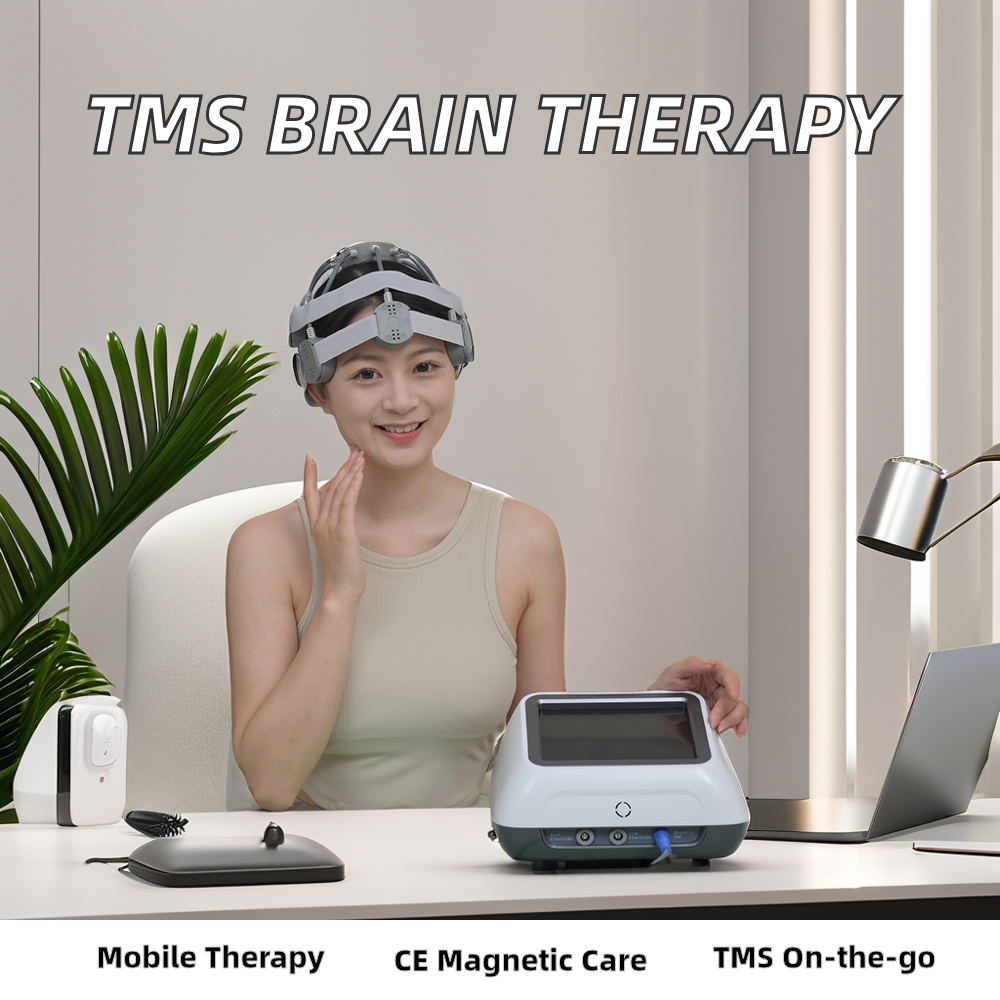Aplicaciones y ventajas multifuncionalesEstimulación magnética Transcraneal (tms)

La estimulación magnética Transcraneal (tms) es una técnica de estimulación cerebral no invasiva que utiliza campos magnéticos para estimular las células nerviosas en el cerebro.Estimulación magnética Transcraneal repetida (rtms)Es una variante del TMS que implica la transmisión de una serie de impulsos magnéticos a intervalos regulares en áreas específicas del cerebro. Esta técnica neuroelectrofisiológica avanzada es ampliamente reconocida en los campos de la psiquiatría clínica, la neurología, la pediatría y la rehabilitación, ya que tiene la posibilidad de tratar diversas enfermedades sin efectos secundarios obvios.
La máquina TMS utiliza una bobina tms, que genera un fuerte campo magnético instantáneo cuando pasa un pulso de corriente rápida. este campo magnético penetra indoloramente en el cráneo e induce una corriente secundaria en el Tejido nervioso adyacente. La eficacia del TMS depende en gran medida de factores como la intensidad de la estimulación, la frecuencia, la posición y la dirección de la bobina del tms.
La aplicación de TMS en la clínica
El TMS ha demostrado una eficacia significativa en el tratamiento de diversas enfermedades neurológicas y mentales.
TMS para el tratamiento de la depresión
El tratamiento de la depresión con TMS tiene como objetivo aliviar los síntomas depresivos regulando el equilibrio de los neurotransmisores y aumentando la plasticidad sináptica. Los estudios han demostrado que el rtms puede mejorar significativamente las funciones emocionales, cognitivas, de sueño y sociales de los pacientes con depresión. Por ejemplo, los estudios han demostrado que el rtms es más eficaz que el 50% en el tratamiento de la depresión refractaria, y algunos estudios han reportado una eficacia de hasta el 60% - 70%. Esta terapia regula los procesos emocionales y cognitivos estimulando áreas específicas del cerebro, como la corteza prefrontal dorsolateral (dlpfc).
TMS alivia el dolor
El TMS también mostró esperanza en el tratamiento del dolor crónico, como el dolor nervioso y la migraña. Al apuntar al Centro de procesamiento del dolor en el cerebro, el TMS puede destruir las señales de dolor y reducir la percepción del dolor.
Rehabilitación del accidente cerebrovascular TMS
El TMS puede usarse para mejorar la recuperación después de un accidente cerebrovascular estimulando las áreas cerebrales afectadas y promoviendo la plasticidad neuronal. Puede mejorar la función motora, la capacidad lingüística y la recuperación cognitiva general de los pacientes con accidente cerebrovascular.
TMS trata la ansiedad y otras enfermedades
El TMS se ha explorado como una opción terapéutica para la ansiedad, el trastorno obsesivo - compulsivo (ocd), el trastorno de estrés postraumático (tept) y otros Estados de salud mental. Al regular la actividad cerebral y los niveles de neurotransmisores, el TMS puede ayudar a aliviar los síntomas de ansiedad y mejorar la salud mental general.
Beneficios de TMS
La no invasividad del TMS lo convierte en una opción de tratamiento atractiva para muchos pacientes. A diferencia del tratamiento farmacológico, el TMS evita posibles efectos secundarios relacionados con el fármaco, como somnolencia, aumento de peso y disfunción sexual. El TMS también es relativamente seguro y los efectos secundarios comunes son leves y efímeros, incluyendo dolor de cabeza, molestias en el cuero cabelludo y mareos.
Eficacia del TMS
Varios ensayos y estudios clínicos apoyan la eficacia del TMS en el tratamiento de diversas enfermedades. Por ejemplo, un estudio publicado en revistas conocidas encontró que el rtms redujo significativamente los síntomas depresivos en pacientes con depresión severa que no respondieron a tratamientos antidepresivos previos. Del mismo modo, otros estudios han demostrado los beneficios del TMS para mejorar la función motora después del accidente cerebrovascular y reducir la intensidad del dolor en pacientes con dolor crónico.
Seguridad Tms y; Efectos secundarios
El TMS suele considerarse seguro y la mayoría de los efectos secundarios son leves y temporales. Sin embargo, al igual que cualquier procedimiento médico, el TMS también tiene riesgos potenciales y complicaciones. Estos incluyen convulsiones raras, dolor de cabeza y pérdida auditiva temporal. Por lo tanto, el TMS debe realizarse bajo la supervisión de un profesional sanitario cualificado y el paciente debe informar a su médico de cabecera de cualquier malestar o reacción adversa.
En resumen, la estimulación magnética Transcraneal (tms) y sus variantes repetidas..rTMS) ofrece una prometedora opción de tratamiento no invasivo para diversas enfermedades neurológicas y mentales. Al estimular áreas específicas del cerebro, el TMS puede aliviar los síntomas, mejorar la función y mejorar la calidad de vida general del paciente. Con la investigación continua y los avances tecnológicos, el TMS tiene un gran potencial para ampliar aún más su aplicación clínica y beneficiar a más pacientes.
PaísUnoLos principales fabricantesTiene invenciones patentadas y puede desarrollar y producir dispositivos médicos de forma independiente. Si lo necesitas, puedesPóngase en contacto con ellosNo hay intermediarios, te lo darán.Precio al por mayorDe la máquina.





